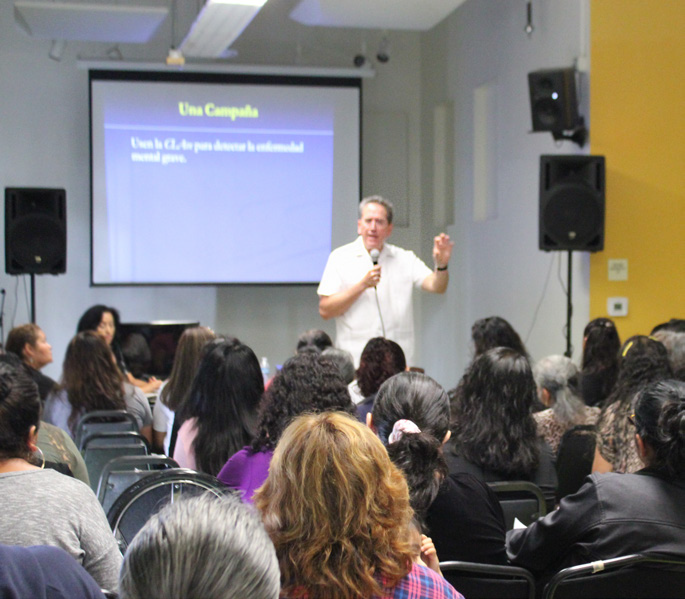Purpose of the program
One of the main goals of the Community Engagement (CE) program is to identify pressing community health needs and work with investigators from the University of Southern California (USC) and Children’s Hospital Los Angeles (CHLA) to respond to those needs in a timely and effective way. One approach that the CE team has used to accomplish this goal is the implementation of Our Community, Our Health (OCOH), a program that began at Washington University in St. Louis. OCOH is designed to bring diverse communities together to foster an ongoing conversation between health researchers and community members. This approach involves planned events that bring researchers into the community to break down the walls between universities and the communities surrounding them. The events are held in community settings such as churches, public libraries and community centers. Each event includes an in-person audience, Spanish/English translation, and a time for audience members to engage in one-on-one discussions with investigators to learn more about the health issues facing their communities. These conversations encourage a mutual understanding of health research and its impact.
The areas immediately surrounding the three SC CTSI campuses (South LA, East LA and Metro LA), have a large Latino community, many of whom are monolingual Spanish speakers. This linguistic barrier can be an enormous hurdle for the community in obtaining accurate information about health and social issues impacting the community. To overcome this barrier, the SC CTSI works to identify bilingual investigators and/or ensures that simultaneous translation is available for all participants, thus improving access and participation in the program.
How are the communities being engaged
The Community Engagement program of the SC CTSI has organized four OCOH events since August 2017. These events have covered various topics, including diabetes, cervical cancer, HPV, depression, mental health, and immigration concerns. Topics are selected based on community feedback. At the end of each session, participants are asked to identify other health issues they would like more information about. Based on this feedback, the CE team works to identify SC CTSI/USC or CHLA investigators with expertise in the area of focus. Investigators who lead an event work with the CE team to develop an interactive presentation that allows for sufficient community input and comment.

Next Steps
The community has responded positively to these events, and has requested more presentations on a number of topics that impact their lives, particularly mental health. Ensuring that the topics resonate with the community is a key to success for the OCOH program, as well as for many other programs require community participation.” In the end, our hope is that OCOH will foster stronger relationships between the community and SC CTSI investigators to help address the many health disparities that impact the diverse communities we serve in southern California.
Get Academic or Community Partnership Assistance
Helping researchers identify partners and foster relationships across academic and community settings
Click hereGet Toolkit for Developing Community Partnerships
This community partnership toolkit outlines the process and approach needed during every phase of community-engaged research including: relationship building, proposal development, project execution and dissemination
Click here